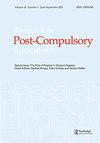社会资本对高等教育组织学习的影响:赋权、创新和竞争优势的工具
IF 0.9
Q3 EDUCATION & EDUCATIONAL RESEARCH
引用次数: 0
摘要
摘要本研究调查了来自约旦五所公立大学的554名教师对社会资本对组织学习的影响。通过探索性因素分析和验证性因素分析对内部社会资本量表和组织学习能力量表进行了验证。验证结果表明,社会资本具有认知、结构和关系三个领域。然而,组织学习被发现只包括两个领域(管理承诺和“内部和外部学习”)。此外,结果表明,社会资本和组织学习在约旦公立大学高度实践。此外,社会资本与组织学习之间存在非常强的正相关关系。最后,研究结果表明,认知社会资本是整体组织学习的最佳预测因子,解释了68.9%的方差。本研究首次填补了有关社会资本对约旦高等教育机构组织学习影响的文献空白。本研究的结果可以被学者和实践者用于非西方文化的进一步研究,并设计策略来改善和维持社会资本和组织学习。关键词:社会资本组织学习高等教育约旦披露声明作者未报告潜在的利益冲突。本文章由计算机程序翻译,如有差异,请以英文原文为准。
The impact of social capital on organisational learning in higher education: a tool for empowerment, innovation, and competitive advantage
ABSTRACTThe present study investigated the impact of social capital on organisational learning as perceived by 554 faculty members from five public universities in Jordan. The internal social capital scale and organisational learning capability scale was validated through exploratory and confirmatory factor analyses. Results of the validation indicated that social capital holds three domains (cognitive, structural, and relational). However, organisational learning was found to include only two domains (management commitment and ‘internal and external learning’). Moreover, results indicated that social capital and organisational learning are highly practiced in Jordanian public universities. Further, a very strong and positive relationship existed between social capital and organisational learning. Finally, results of the study indicated that the cognitive social capital was the best predictor of overall organisational learning explaining 68.9% of the variance. This study is considered the first to fill the gap in the literature regarding the impact of social capital on organisational learning in higher education institutions from Jordan. The results of this study can be used by academics and practitioners to further research in a non-western culture and to design strategies to improve and sustain social capital and organisational learning.KEYWORDS: Social capitalorganisational learninghigher educationJordan Disclosure statementNo potential conflict of interest was reported by the author(s).
求助全文
通过发布文献求助,成功后即可免费获取论文全文。
去求助
来源期刊

Research in Post-Compulsory Education
EDUCATION & EDUCATIONAL RESEARCH-
CiteScore
1.30
自引率
14.30%
发文量
31
期刊介绍:
Throughout the world, there is a growing awareness of the significance of vocational and post-compulsory education and training systems. The majority of countries are working hard to develop their provision, recognising the importance of post-compulsory education in providing educated and skilled people in sufficient numbers at appropriate levels to assist economic and social development. Research in Post-Compulsory Education, sponsored by the United Kingdom"s Further Education Research Association (FERA), recognises the need for more international research and analysis and the generation of relevant theory in order to identify policy needs and trends as well as priorities in this growing area.
 求助内容:
求助内容: 应助结果提醒方式:
应助结果提醒方式:


